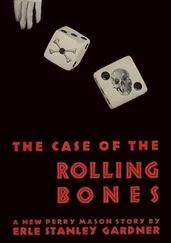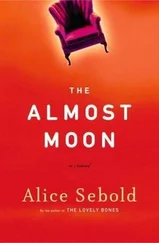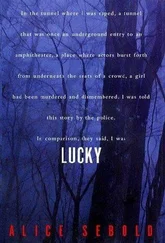She stared at the tops of the trees, which, miles from our development, were the tallest things around. They stood on a high hill that had never been cleared for houses and on which a few old farmers still dwelled.
“I can’t describe what I’m feeling,” she said. “To anyone.”
They reached the end of the development just as the sun was going down over the hill in front of them. A moment passed without either of them turning around. My mother watched the last light flicker in a drain-off puddle at the end of the road.
“I don’t know what to do,” she said. “It’s all over now.”
My grandmother was not sure what she meant by “it,” but she did not press harder.
“Shall we head back?” my grandmother offered.
“How?” my mother said.
“To the house, Abigail. Head back to the house.”
They turned and began walking again. The houses one after another, identical in structure. Only what my grandmother thought of as their accessories marked them as different. She had never understood places like this – places where her own child had chosen to live.
“When we get to the turn to the circle,” my mother said, “I want to walk past it.”
“His house?”
“Yes.”
I watched Grandma Lynn turn when my mother turned.
“Would you promise me not to see the man anymore?” my grandmother asked.
“Who?”
“The man you’re involved with. That’s what I’ve been talking about.”
“I’m not involved with anyone,” my mother said. Her mind flew like a bird from one rooftop to the next. “Mother?” she said, and turned.
“Abigail?”
“If I needed to get away for a while, could I use Daddy’s cabin?”
“Have you been listening to me?”
They could smell something in the air, and again my mother’s anxious, agile mind slipped away. “Someone is smoking,” she said.
Grandma Lynn was staring at her child. The pragmatic, prim mistress that my mother had always been was gone. She was flighty and distracted. My grandmother had nothing left to say to her.
“They’re foreign cigarettes,” my mother said. “Let’s go find them!”
And in the fading light my grandmother stared, flabbergasted, as my mother began to follow the scent to its source.
“I’m heading back,” my grandmother said.
But my mother kept walking.
She found the source of the smoke soon enough. It was Ruana Singh, standing behind a tall fir tree in her backyard.
“Hello,” my mother said.
Ruana did not start as I thought she would. Her calmness had become something practiced. She could make a breath last through the most startling event, whether it was her son being accused of murder by the police or her husband running their dinner party as if it were an academic committee meeting. She had told Ray he could go upstairs, and then she had disappeared out the back door and not been missed.
“Mrs. Salmon,” Ruana said, exhaling the heady smell of her cigarettes. In a rush of smoke and warmth my mother met Ruana’s extended hand. “I’m so glad to see you.”
“Are you having a party?” my mother asked.
“My husband is having a party. I am the hostess.”
My mother smiled.
“This is a weird place we both live,” Ruana said.
Their eyes met. My mother nodded her head. Back on the road somewhere was her own mother, but for right now she, like Ruana, was on a quiet island off the mainland.
“Do you have another cigarette?”
“Absolutely, Mrs. Salmon, yes.” Ruana fished into the pocket of her long black cardigan and held out the pack and her lighter. “Dunhills,” she said. “I hope that’s all right.”
My mother lit her cigarette and handed the blue package with its golden foil back to Ruana. “Abigail,” she said as she exhaled. “Please call me Abigail.”
Up in his room with his lights off, Ray could smell his mother’s cigarettes, which she never accused him of pilfering, just as he never let on that he knew she had them. He heard voices downstairs – the loud sounds of his father and his colleagues speaking six different languages and laughing delightedly over the oh-so-American holiday to come. He did not know that my mother was out on the lawn with his mother or that I was watching him sit in his window and smell their sweet tobacco. Soon he would turn away from the window and switch on the small light by his bed to read. Mrs. McBride had told them to find a sonnet they’d like to write a paper on, but as he read the lines of those available to him in his Norton Anthology he kept drifting back to the moment he wished he could take back and do over again. If he had just kissed me on the scaffold, maybe everything would have turned out differently.
Grandma Lynn kept on the course she had set with my mother, and, eventually, there it was – the house they tried to forget while living two houses down. Jack was right , my grandmother thought. She could even feel it in the dark. The place radiated something malevolent. She shivered and began to hear the crickets and see the fireflies gathering in a swarm above his front flower beds. She thought suddenly that she would do nothing but sympathize with her daughter. Her child was living inside the middle of a ground zero to which no affair on her own husband’s part could offer her insight. She would tell my mother in the morning that the keys to the cabin would always be there for her if she needed them.
That night my mother had what she considered a wonderful dream. She dreamed of the country of India, where she had never been. There were orange traffic cones and beautiful lapis lazuli insects with mandibles of gold. A young girl was being led through the streets. She was taken to a pyre where she was wound in a sheet and placed up on a platform built from sticks. The bright fire that consumed her brought my mother into that deep, light, dreamlike bliss. The girl was being burned alive, but, first, there had been her body, clean and whole.
For a week Lindsey cased my killer’s house. She was doing exactly what he did to everyone else.
She had agreed to train with the boys’ soccer team all year in preparation for the challenge Mr. Dewitt and Samuel encouraged her to take on: qualifying to play in the all-male high school soccer league. And Samuel, to show his support, trained alongside her with no hope of qualifying for anything, he said, other than “fastest guy in shorts.”
He could run, even if kicking and fielding and noticing a ball anywhere within his vicinity were all beyond him. And so, while they did laps around the neighborhood, each time Lindsey shot a look toward Mr. Harvey’s house, Samuel was out in front, setting the pace for her – unaware of anything else.
Inside the green house, Mr. Harvey was looking out. He saw her watching and he began to itch. It had been almost a year now, but the Salmons remained bent on crowding him.
It had happened before in other towns and states. The family of a girl suspected him but no one else did. He had perfected his patter to the police, a certain obsequious innocence peppered with wonder about their procedures or useless ideas that he presented as if they might help. Bringing up the Ellis boy with Fenerman had been a good stroke, and the lie that he was a widower always helped. He fashioned a wife out of whichever victim he’d recently been taking pleasure in in his memory, and to flesh her out there was always his mother.
He left the house every day for an hour or two in the afternoon. He would pick up any supplies he needed and then drive out to Valley Forge Park and walk the paved roads and the unpaved trails and find himself suddenly surrounded by school tours at George Washington’s log cabin or the Washington Memorial Chapel. This would buoy him up – these moments when the children were eager to see history, as if they might actually find a long silver hair from Washington’s wig caught on the rough end of a log post.
Читать дальше












